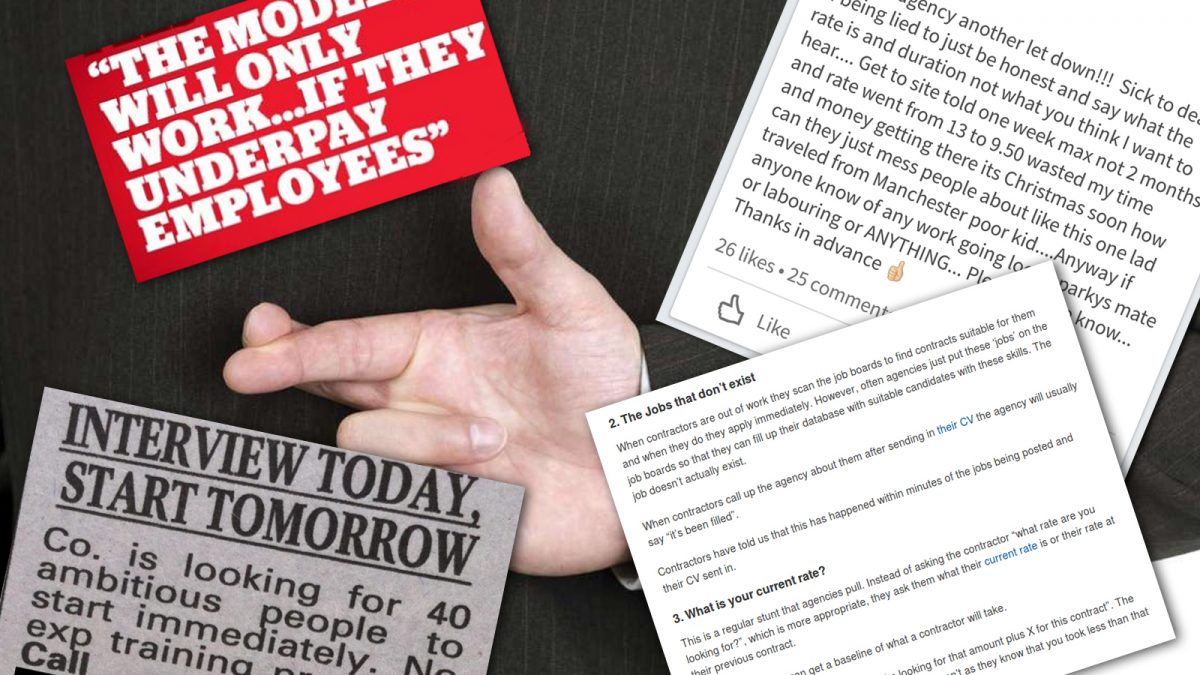- Contact us:
- 03300 535 600
- hello@staffone.co.uk
We come across queries on a daily basis about our processes and our function in the industries we supply. We see stories in the media and hear conversations about the perception of the recruiter and many times Chinese whispers and misconceptions actually cast a negative light on what it is that recruitment agencies and consultancies actually do.
In this week’s blog post we decided to shed some light on a few common misconceptions and provide a response to assumptions. Whilst we aren’t saying that there aren’t any unscrupulous recruitment businesses out there, we can only speak for ourselves and many others leading the way with quality service and supply.
“Agencies get paid an amount for each hour you work and skim a bit off for themselves”
Agencies have a typical “going rate” for each profession they supply. Some companies have preferred supplier agreements in which these rates are fixed with their agency partner, some work with a ballpark figure. For permanent recruitment, fees are a lot more clear as they are based around a percentage of your salary. Rather than considering the money to be the entire wage of the candidate that gets a chunk bitten out of it by the recruiter; it’s actually the recruiters service charge out of which the operative is paid and the company meets its overheads.
“Don’t tell a Recruiter your wage if they ask, they’ll never pay you more than that in the future”
Recruiters have to be mindful that employees talk to one another. Even more so when they are contractors. It is widely understood that a contractor who isn’t happy with their wage will be very vocal about it. Underpaying a member of staff for the sake of a small return can actually have very negative effects, a good recruiter knows this. The amount of work taken to find and deploy an operative into a role will be a complete waste of time if they get there and find that they are being paid considerably less than they should be or if the task is far below their pay grade. The outcome will be that their client and candidate will be dissatisfied, most likely the worker will leave and the recruiter will have to go through the entire process again. The ultimate aim of the recruiter is to get the right person, paid the going rate, to do a job they are capable of, for as long as they can. This process leads to the worker, the recruiter and the client being happy in every assignment.
“Don’t give recruiters references, they’ll only use these as companies to sell into”
This is a bit of a difficult one. There are some horror stories of idle recruiters without any roles to fill that call candidates, especially those seeking trades and labour roles, telling them of vacancies and asking for references. Assuming the references are also people in companies that also use agencies too, the recruiter then has a direct route to a decision maker. Whilst this does (unfortunately) happen, it only happens in instances where the candidate is so eager to get hired that they forget first to say “tell me a little bit about the job”. Recruitment is a two way street and before you, as a candidate give your approval for your name, CV or interview to be confirmed, it should be a given that you ask a few questions. Especially if you haven’t worked with that particular recruiter before. If you have worked with a recruiter then your previous track record should be a given and they should be able to vouch for you.
“Don’t tell a Recruiter if you’ve had a recent interview – it’s a scam”
This is a bit of a difficult one to debunk but is much like the one above. Unscrupulous recruiters will ask if you’ve had an interview recently on the premise that they don’t want to put you forward to the same company if you are already in their recruitment process. Once you tell them which company you have interviewed with they will then have an “in” and be able to send them additional CV’s to try to get their foot in the door. Again, as above, you don’t need to dish this information out in order to get a job. Inf act you don’t need to tell the truth at all. A simple “no” avoids the cross-selling and if they do sell you in to a company you have already been in discussions with then they will know about it fairly quickly.
“Recruiters sit back whilst you earn them money”
Recruiters can’t sit back. The money earned through fees cover their wages, yes, but the cost of insurance, systems, marketing, payroll and the wages to pay the candidate – often weeks before their client pays them – means that the recruiter can’t rest. Once one role or campaign has been successfully resourced, they have to be on the lookout for the next one. In fact a good recruiter should be dealing with multiple roles in their industry at any one time. If the role is for a temporary assignment, the recruiter should be looking at the next assignment for you to move on to after you’ve completed the job you’re in. All of this needs to be achieved whilst also selling and introducing their service to other businesses within their industry.
“Recruiters keep wages low and decrease opportunities”
Completely the opposite. Without recruitment partners, smaller companies would be unable to win larger projects, cope with peaks in trade, or operate in areas outside their main trading location.
Recruitment businesses actually enable companies to take on work and to expand without the long term risk of hiring additional staff for what could be a short term opportunity.
In the case of permanent recruitment, Recruiters actually widen the field of opportunity, whereas an employer may only have the time and the resources to advertise a role internally or through one platform, a good recruiter will make sure that the role is communicated across a multitude of platforms, from job boards to social media to print to their own often diverse database. Giving even more candidates the opportunity to find the role.
Much like any other business or service, there will be the good, the bad and the ugly. We strongly encourage candidates to ask questions and to find out more about their recruiter before entrusting them with their career. A good recruiter won’t have an issue with being questioned about a role, in fact it shows more interest on the candidates part if they ask questions.
If you find a good recruiter, stick with them, help them to help you by letting them know how the job is going and keep them up to date with any developments in the role.
Here are a few examples of the sort of questions you might want to ask a recruiter when being offered a role:
“Am I alone in this task or have you supplied other [insert your role here?” (if so “are we all being paid at the same rate?”)
“Is this a fixed term contract? Could it go on longer or could it end sooner?”
“Have you supplied [your profession] to this company previously?”
“What is the reason for this role being recruited?”
“Are you their sole supplier or will I be working with other agency staff?”
And finally, the one that often gets forgotten by the polite masses is:
“Can they pay more?” / “Is there room for an increase in the rate” / “Do they pay travel/board/lodge/PPE”
– If you don’t ask, you won’t get.






